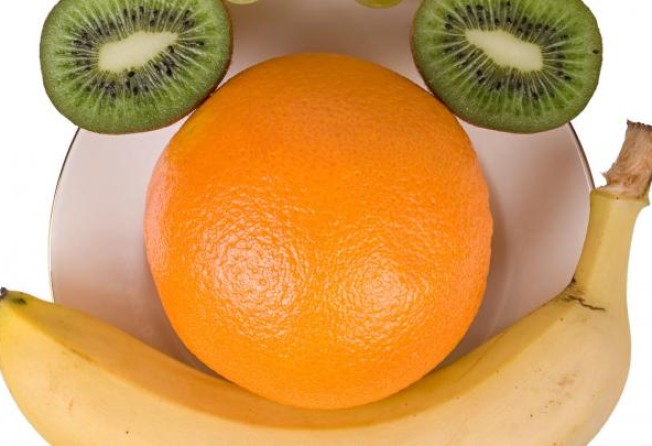Eat yourself happy this winter

Happiness comes from within, or so the saying goes. Many would suggest we take this phrase in its literal form, by taking a good, hard look at the food we eat on a daily basis. And anyone suffering from the "blues" this winter (or at any other time of the year) could be well-advised to take note: there is such a thing as a meal that makes you happy, experts say.
We're not talking about meals commonly available in fast-food chains. According to nutritional experts, types of "happy" food would look less like a burger, chips and a fizzy drink and more like turkey or wild salmon, dark green vegetables, and sweet potatoes or basmati rice for the main course. For dessert it would be citrus fruits, raw chocolate, berries, nuts and seeds.
What makes this meal "happy" is the collection of nutrients it packs: tryptophan (turkey), omega-3 (salmon), vitamin B12 (turkey and salmon), folate (green vegetables), niacin (brown rice), vitamin B6 (nuts), phenylalanine (nuts and seeds), magnesium (chocolate) and vitamin C (citrus fruits).
When combined, they spark the necessary chain of events that allow us to release more of the "happy neurotransmitters" produced in our bodies, such as serotonin and dopamine.
The route to plentiful serotonin namely lies in a tryptophan-rich diet, but the essential amino acid can only do its job when combined with other key nutrients, says Bernice Cheung Ho-ki, dietitian at the Chinese University of Hong Kong's Centre for Nutritional Studies.
"The conversion of tryptophan to serotonin is a two-step process [which] requires catalysts like vitamin B6, folate, niacin and B12," she says.
The same goes for dopamine, which requires phenylalanine, tyrosine, folate, niacin and vitamins C and B6, she says.
Key components of a "happy food" diet, according to Alicia Maetzener, nutritional therapist at Vitality Centre in Central, are things like tyrosene-rich almonds (make you alert), avocado (has healthy fats and B vitamins), eggs (Maetzener recommends omega-3 eggs with vitamins B and D), and fish, in particular wild salmon.
There have been several studies on omega-3 and its effects on mood. "The people who get seasonal affective disorder tend to be in North America and [northern] Europe, but not so much in Japan [in North Asia] where the diet is higher in fish," says Maetzener.
Omega-3 and vitamin B are specifically used in treating those with mood disorders, adds Benita Perch, naturopathic practitioner at Integrated Medicine Institute in Central. "I tend to give depressive patients omega-3 and B-complex," she says.
Perch stresses the importance of good quality fats - like those found in coconut or avocado oils - in any diet designed to elevate mood.
"Our cells are made of protein and the phospholipid bilayer. They are the gateway to the cell. If that layer is made up of good quality fat then they can function better," she says. "[A lack of] fatty acids can be the reason why some people are depressed."
Ironically, eating fat can be a good way of preventing ourselves from, well, eating fat. Anita Cheung, founder and director of i-Detox in Central, stresses the importance of "good fat", because it can help prevent those less used to healthy eating from veering away from the "happy diet" and in the direction of more alluring - but far less nutritious and beneficial - type of meals.
"The nervous system is fat-based," Cheung says. "Every cell needs fat but the nerve cells are more fat-dependent. So the basic diet should contain a healthy fat contingent like macadamias and cashews. And when we are satisfied with our fat intake from healthy foods, then we crave bad fats less."
Variety ultimately is the key to happiness, experts say. "In general there is no magic formula. There are no single nutrients that can do it all," says Dr Edmund Li, associate professor with the School of Biological Sciences at University of Hong Kong.
"There is a lot of data that suggests poor eating relates to poor mental function, so a healthy balanced diet is sensible. With food and mood … there is no doubt there is some link there."
Common sense does tend to prevail, then, if we seriously want to eat our way to happiness.
Perch recommends an anti-inflammatory wholefood diet. Strike out white food, fried food, red meat and sugar, and load up on brown rice, wholewheat pasta, legumes, beans, fruits and vegetables. "You should be eating at least nine servings of fruit and vegetables every day," she says. "It's a complete lifestyle change."
But anyone who is too wary of the prospect of having to be too healthy to be happy will at least take comfort in one of the top happy foods: chocolate.
"Cacao is packed with antioxidants," says Cheung. "It provides many minerals we are deficient in, such as magnesium, which boosts endorphins, the bliss chemical."
It is also a good source of chromium, iron, manganese, zinc, copper and omega-6 fatty acids.